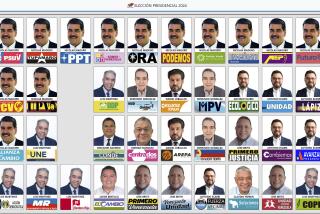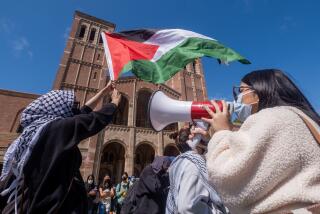For Iraqis, Vote for Hussein Is an Exercise in Democracy
BAGHDAD — Veteran high school history teacher Saladin Fadahl proudly sports a Saddam Hussein pin on his shirt pocket and wants the whole world to know that he loves his president very dearly.
Going even further, Ahmed Abdul Latif, 30, said he wants the world to know that Iraq is a democracy and not the dictatorship that President Bush has made it out to be. It is a place where everyone is free -- free “to show love for the president.”
They are among the 11 million eligible voters who will be asked to demonstrate that love by casting their ballots today in support of Hussein’s leadership -- or against it. Officials are very serious about the referendum and hopeful it will spread a message around the world that Iraqis choose to live under an iron fist.
Of course the outcome is preordained. But then, so is Western reaction.
“I know in the West, maybe it does not mean anything,” said Saad Naji Jawad, a political science professor at Baghdad University.
Western diplomats and academics said many Iraqis sincerely believe an overwhelming yes vote will show popular support for keeping Hussein in power. The referendum also serves to rally the public at a time when war with the United States appears ever more likely.
“In their view they will show the world they are in unity,” one European diplomat said. But outside of Iraq, “everybody will laugh.”
Internally, the results can be used to identify any pockets of resistance. Authorities, for example, will be keeping close watch on the low-income neighborhood of Saddam Hussein City, where most of the residents are Shiite Muslims. The country is ruled by minority Sunni Muslims.
“What they fear most now is domestic unrest,” said a European diplomat. “They need to feel and look unified.”
Unity is the goal, but at the moment, analysts say, there is a division within the Hussein government. One faction argues that the U.S. will attack no matter what Iraq does, so more military preparations are needed. The other group believes a war still can be stopped, so all diplomatic efforts should be pursued.
The government is taking steps to address the concerns of both camps, diplomats said. For the hard-liners, the government has distributed weapons to tribe members and has created a special security force to protect the president. It is making it difficult for draft-age men, doctors and engineers to travel abroad and it has tried to smooth over relations with religious leaders. The other camp is hoping the referendum will convince the world that Iraq is not interested in a change in regime and that a strong showing will give Hussein more legitimacy.
How Iraqis truly feel is anybody’s guess. It is not permitted to put up posters that would say, for example, “Vote No on Referendum Day.” There are no open debates or forums to discuss the legacy of Hussein’s 30 years in control. No one is talking about the huge sums the Baath Party initially spent on electrification and education for the masses, or how the nation’s oil wealth was funneled into disastrous war efforts against Iran and in Kuwait.
This is about adulation.
“Yes, yes to our beloved leader Saddam Hussein. Yes, yes,” read one of the thousands of banners hung from buildings all over this city. It was decorated with red hearts. Another read: “Our Blood Our Soul for Saddam Hussein.”
The referendum is scheduled by law to take place every seven years. During the last vote, held in 1995, Hussein garnered a whopping 99.96% -- a victory that was so one-sided it undermined the very message of democratic participation and widespread support organizers had hoped it would deliver. This time, hundreds of journalists, routinely denied visas, have been allowed in to report on the referendum. But a message has been delivered that reentry to Iraq may depend on how the vote is covered.
Ironically, officials said the threat hanging over the Hussein regime may actually boost support for the president, as Serbs rallied around then-President Slobodan Milosevic during the North Atlantic Treaty Organization bombing of Yugoslavia.
“Even if they hate the regime, they are not looking for America to save them,” said a European diplomat based here.
Another diplomat said Iraqis have never had a democratic system and, because they are largely isolated from the rest of the world through restrictions on what they can watch and read, they truly perceive the referendum as being democratic.
In Baghdad Monday, Fadahl and Abdul Latif were getting ready for the 5,500 registered voters who live along Palestine Street in a middle-class neighborhood of one- and two-story single-family houses. The community polling place was the Tagami Elementary School.
Fadahl proudly showed off the many, many portraits displayed around the school lobby of the president. One was framed in Christmas garland. Another in silk flowers. Still another in both.
Fadahl pointed to the ballot box, a white plywood container also decorated with pictures of the president and silk flowers. He pointed to the lock on the ballot box and said that a “lawman” will be around in the morning to make sure it is empty when the day starts and to make sure the ballots are properly counted.
Asked if anyone voted no in 1995, his reply was no. Asked if anyone will vote no this time, Fadahl said, “Maybe.”
“All our people love our leader,” he said.
More to Read
Sign up for Essential California
The most important California stories and recommendations in your inbox every morning.
You may occasionally receive promotional content from the Los Angeles Times.










